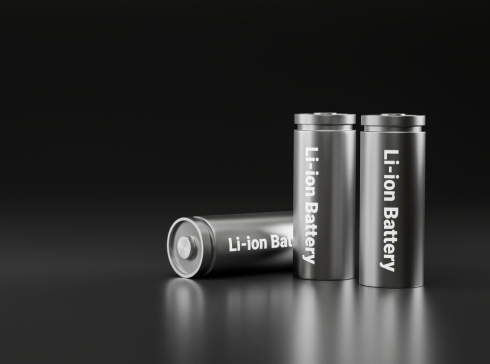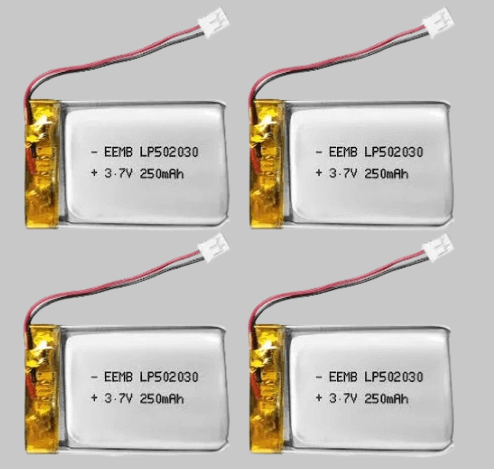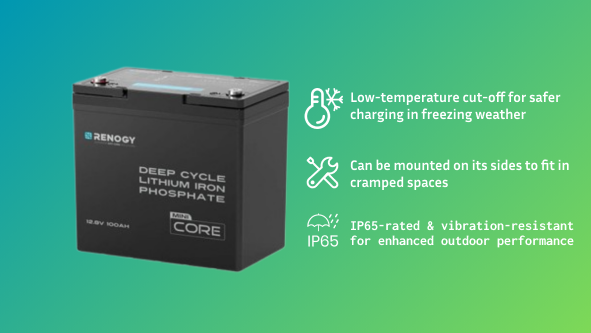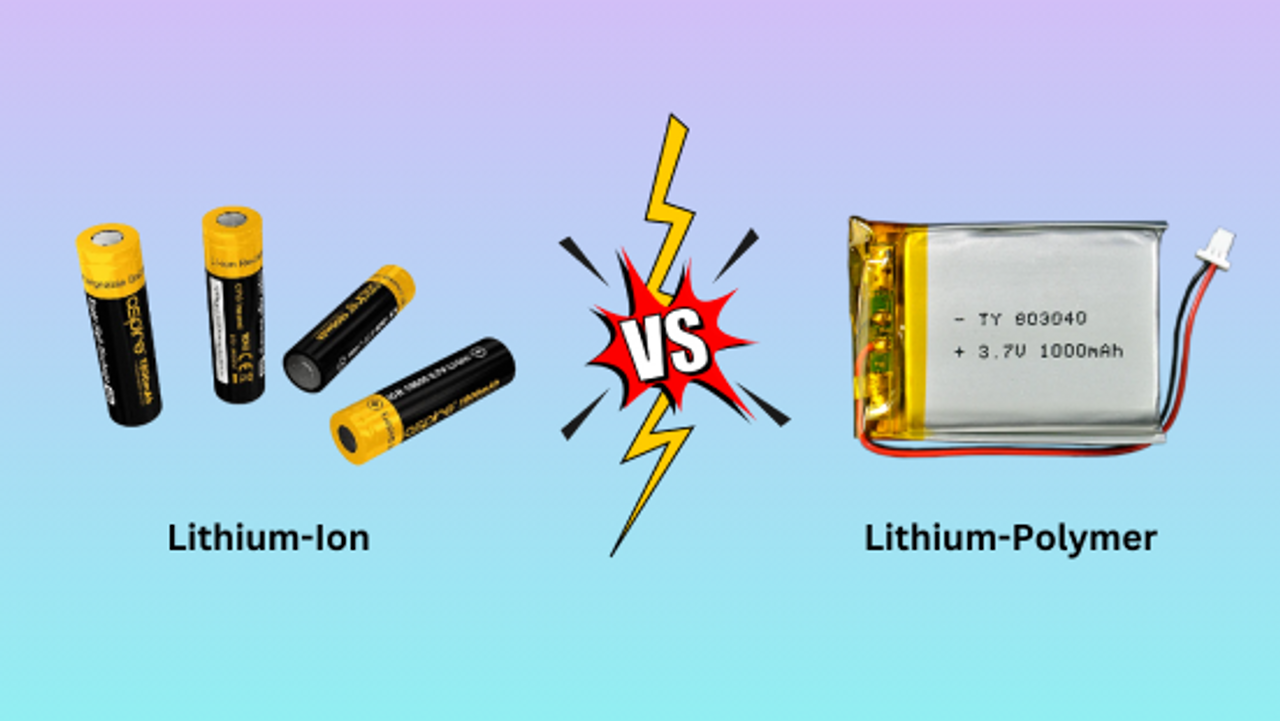Lithium-Ion Vs. Lithium-Polymer Batteries: What’s the Differences?
As modern energy storage solutions continue to evolve and increase in demand, battery technology has also advanced to meet these energy storage demands. One of the prevalent battery technologies in the market today is the lithium-ion and lithium polymer. Although these two battery types share a few similar features, they are distinct in their operation mechanisms, features, and applications. In this article, let's compare lithium ion vs lithium polymer and as we highlight their differences.
What Are Lithium-Ion Batteries?

Lithium-ion batteries are rechargeable and probably the most common battery types in the world today after lead-acid. They were invented in 1859. They are not only affordable, but they are high-performance and versatile. Lithium-ion batteries usually come in a stainless steel or aluminum cylindrical or rectangular (prismatic) encasement.
When discharging, lithium atoms in the anode are ionized and separated from electrons. Lithium ions move to the cathode from the anode by flowing through the electrolyte. Lithium ions are small which enables them to flow freely through a semipermeable separator.
What Are Lithium-Polymer Batteries?

Lithium-polymer batteries also commonly known as LiPo batteries have amassed attention due to their innovative design. Unlike other battery types that use liquid electrolytes, LiPo batteries feature a solid or gel-like electrolyte which enables them to have flexible shape and size.
Their special composition enables the manufacturers to create thinner and lighter batteries, which makes them suitable for use on compact and sleek electronics. Lithium-polymer batteries have a higher discharge rate than lithium-ion batteries.
What are the Differences Between Lithium-Ion Batteries and Lithium Polymer Batteries?
Battery consumers are keen on the type of batteries they use for various applications. Some of the questions the consumers are faced with when choosing batteries include, are the batteries meeting my energy needs, are the batteries eco-friendly, or are the batteries safe for use in limited spaces among others?
The most visible battery type in the market today is the lithium battery. Lithium batteries are categorized into various types, such as lithium-ion, lithium polymer, and lithium cobalt oxide (LCO) among others. Today, let’s see the differences between lithium-ion vs lithium-polymer batteries.
1. Composition
Lithium-ion batteries are made of several cylindrical or prismatic cells. Every cell has a cathode (the positive electrode) and an anode ( the negative electrode). A porous separator sits between the anode and the cathode to allow free movement of lithium ions when the battery is charging or discharging.
The lithium polymer batteries have a similar electrode composition to that of lithium-ion batteries. However, the material of the electrode is applied in a gel-like or solid polymer matrix.
Unlike lithium-ion batteries, lithium-polymers do not have a porous separator, which allows for higher flexibility in the form factor of the battery. Also, lithium-polymer batteries have a flexible casing material that allows them to adjust to any size or shape.
2. Performance
Lithium-ion batteries perform better than the lithium-polymer batteries. Also, lithium-ion batteries have higher energy density than lithium polymer. They are capable of storing more energy per weight or unit volume. This aspect makes them suitable for high-capacity applications such as electric vehicles and solar power storage.
Lithium-polymer batteries have faster charging capabilities that can handle high charging currents. Also, they are capable of handling lower self-discharge rates for improved general efficiency.
3. Safety and Durability
All lithium batteries are safe. However, both lithium-ion and lithium-polymer have a different safety profile. Lithium-polymers are safer compared to lithium-ion, due to their gel-like electrolyte which minimizes risks of fire or leakage.
Additionally, lithium-polymer batteries have a higher mechanical stability which minimizes the likelihood of puncture or damage.
Lithium-ion batteries feature a built-in protection circuit that monitors temperature, current, and voltage to minimize instances of overheating, excessive temperature rise, and over-discharging. The protection circuit reduces the risk of thermal runaway and provides an additional layer of safety.
4. The Costs
Lithium batteries have been on the market longer than lithium-polymers. As a result, they have an advantage of economies of scale, technology advancements, and optimized manufacturing processes.
Over the years, the production of lithium-ion batteries has become highly cost-efficient. Additionally, the high demand for lithium-ion batteries across various industries has further caused the prices to become favorable.
On the other hand, Lithium-polymer batteries have high production costs, due to the manufacturing complexities, which contribute to the high costs.
5. Charging Requirements
Lithium-polymer batteries are highly sensitive to overcharging and they must adhere to specific voltage parameters. Therefore, they require specialized chargers.
Lithium-ion batteries are compatible with a wide range of chargers, which allows more flexibility when it comes to charging.
6. Battery Applications
Lithium-ion batteries are more versatile than lithium polymer. They are widely used in nearly all electronic devices, such as electric vehicles, smartphones, and laptops, among other applications. On the other hand, lithium-polymer batteries are suitable for small-sized and compact devices such as watches, small appliances, and light aircrafts. Devices such as drones benefit from lithium-polymer devices due to their lightweight nature.
Lithium-Ion vs. Lithium-Polymer, which is Better?
Lithium-Ion (Li-Ion) and Lithium-Polymer (Li-Po) batteries are both popular rechargeable power sources, each with distinct advantages and drawbacks. Li-Ion batteries, known for their high energy density and long lifespan, have been the go-to choice for many electronic devices. They offer excellent performance in a compact size, making them ideal for smartphones, laptops, and electric vehicles.
Li-Ion batteries also have a lower self-discharge rate, meaning they retain their charge better when not in use. On the other hand, Li-Po batteries have gained traction due to their flexibility in shape and size, allowing for sleeker device designs. They're often found in ultra-thin smartphones, wearables, and drones. Li-Po batteries can be manufactured in various forms, including thin sheets, which is not possible with Li-Ion batteries.
While Li-Po batteries generally have a shorter lifespan and lower energy density compared to Li-Ion, they offer better performance in extreme temperatures and have a lower risk of electrolyte leakage. Safety-wise, Li-Po batteries are considered slightly safer due to their polymer electrolyte, which is less flammable than the liquid electrolyte in Li-Ion batteries.
However, both types require proper handling and charging to prevent safety issues. The choice between Li-Ion and Li-Po often depends on the specific application, with Li-Ion excelling in high-capacity, long-life scenarios, and Li-Po being preferred for devices requiring thin, flexible, or uniquely shaped batteries. As technology advances, the lines between these two battery types are blurring, with hybrid designs emerging to combine the best features of both.
While lithium ions are excellent for cost-effectiveness and energy density, lithium polymers are more flexible and ideal for smaller and lightweight appliances. Understanding their key differences and capabilities will enable you to buy the best-suited battery based on your applications.
Choose Your Proper Battery

Discover the future of portable power with Renogy's revolutionary Lithium-Ion batteries, specifically the Core Mini 12.8V 100Ah Lithium Iron Phosphate Battery. This battery combines lightweight design with unparalleled performance, perfect for RVs, boats, and off-grid living, . Its integrated metallic cell spacers ensure exceptional vibration resistance, making it ideal for rough terrain and choppy waters.
With a lifespan ten times longer than traditional lead-acid batteries and an impressive 5000 cycle depth of discharge at 80%, the Core Mini is an investment that keeps on giving. Need high power output? This battery delivers, with a 300A discharge within 5 seconds, easily powering demanding appliances like microwaves.
Safety is paramount, evidenced by UL, FCC, and CE certifications, along with an IP65 rating for durability in various environments. From its low-temperature charging capability to its wide operating temperature range, the Renogy Core Mini adapts to your needs.
Conclusion
In the lithium ion vs lithium polymer debate, each has its strengths. Li-ion offers higher energy density and longevity, ideal for smartphones and EVs. Li-polymer provides design flexibility and better performance in extreme conditions, suiting thin devices and wearables. The choice depends on specific needs, with both types continually evolving to meet diverse power requirements.
Lithium-Ion vs. Lithium Polymer Batteries FAQs
1. Do Lithium-ion batteries have a longer lifespan than Lithium-polymer batteries?
Yes. Generally, lithium-ion batteries have a longer lifespan than lithium polymer, especially when they are exposed to similar conditions and usages.
2. What are the disadvantages of lithium-polymer batteries?
Lithium-polymer batteries typically offer lower energy density and shorter lifespans than lithium-ion counterparts. Their higher manufacturing costs, susceptibility to swelling, and sensitivity to temperature extremes can be limiting. Additionally, they require careful handling to prevent damage and tend to lose capacity faster when not in use, potentially restricting their application in certain devices.
3. Can I use a lithium-ion battery in place of a lithium-polymer battery?
It is possible to switch the batteries, but it is not recommended. Due to the form factor of Lipo, in size and shape flexibility, a lithium-ion battery may not fit well on devices designed for lithium polymer batteries.











